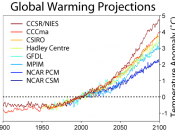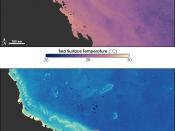What is Global warming?Global warming refers to an average increase in the Earth's temperature, which causes changes in the climate. Increase in temperature may lead to changes in rainfall patterns, a rise in sea level, and a wide range of impacts on plants, wildlife, and humans. When scientists talk about the issue of climate change, their concern is about global warming caused by human activities.()The current major warming trend began about 18,000 years ago with the end of the last Ice Age. Since then, the oceans have risen hundreds of feet and glaciers have melted. Ice once stood a mile high, as that ice melted, the oceans rose.
Sea-level has risen about 130 meters (400 ft) since the peak of the last ice age about 18,000 years ago. Most of the rise occurred before 6,000 years ago. Global warming has been happening for millions of years.
Effects:Australia is vulnerable to changes in temperature and precipitation for the next 50 to 100 years, because it already has extensive arid and semi-arid areas, relatively high rainfall variability from year to year, and existing pressures on water supply in many areas.
In addition, vulnerability arises due to high fire risk, Australian ecosystems sensitive to climate change, and invasion by exotic animal and plant species introduced by human activity. Australia also has a high concentration of population in coastal areas, an economy strongly dependent on world commodity prices, tourism dependent on the health of the Great Barrier Reef and other fragile ecosystems, and economically and socially disadvantaged groups of people. Impacts of climate change will be complex and to some degree uncertain, but increased foresight would enable us to optimise the future through planned adaptation and mitigation. Mitigation can reduce the ultimate extent of climate change and its impacts, but is a global problem...


